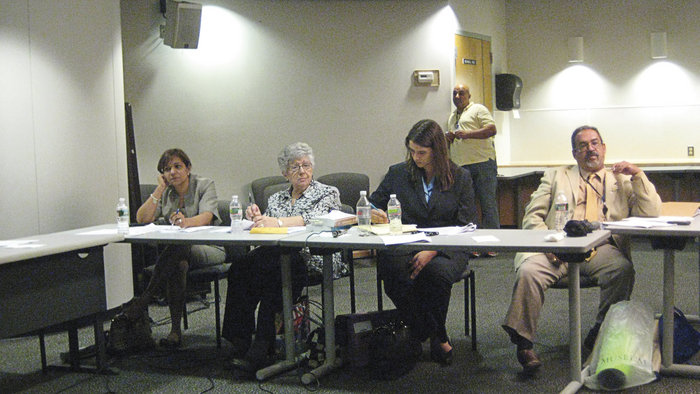At the urging of some parent activists, the statewide nonprofit group Citizens Campaign is asking the Jersey City Board of Education to adopt stricter policies barring campaign contributors from receiving no-bid contracts. Citizens Campaign staffers are expected to attend public school board meetings this month to ask school trustees to support this and other “pay to play” reforms.
At least two board members have in recent weeks expressed an interest in sponsoring some type of pay to play policy for the Board of Education, and others have indicated they would be supportive of some type of ban on contracts to campaign contributors. It remains to be seen whether the board will adopt the model language drafted by the Citizens Campaign or will adopt different language.
Pay to play laws forbid campaign donors from getting contracts with a government body within a certain period of time after donating. This cuts down on the possibility of donating to a candidate specifically for the purpose of getting a contract.
Some parents have called for stricter guidelines regarding school board contracts for campaign contributors in recent months.
‘If this gets adopted this would be one of the strongest pay to play laws in the state.’ – Heather Taylor
____________
In October 2011, the school board awarded a one-year $50,000 contract to the law firm of Florio Perrucci Steinhardt & Fader LLC. Paul Fader, a partner in the law firm, has allegedly raised money for the 2013 mayoral campaign of Ward E City Councilman Steven Fulop, who endorsed and supported eight of the nine current school board members.
Current policy
The New Jersey Department of Education already has rules regarding pay to play, and the law applies to the Jersey City Public School District. Individual school boards can abide by the state’s pay to play law, or they can adopt their own more stringent policies, if they choose.
“The state Department of Education passed a policy in 2008 requiring every school board to have a pay to play policy. Having a policy is a requirement to get state aid,” said Citizens Campaign spokeswoman Heather Taylor. “So, there is currently a policy in Jersey City, but we feel it could be strengthened and that there are some gaps in the policy that could be closed.”
That Jersey City does indeed have a policy regulating contracts to campaign contributors may have come as a surprise to school board members, who have recently stated that such a policy is needed. Three weeks ago the board’s in-house attorney, Scott Eveland, sent a copy of the school board policy to a parent activist who has since circulated it to school board members, parents groups, and the local news media.
Under this policy, a board member is prohibited from voting on contracts worth $17,500 or more to businesses that have made contributions to their political campaign. Contractors are also barred from making contributions to school board members during the life of the contract, and companies bidding on a contract worth $17,500 or more must disclose any political contributions made within the year prior to the start of the contract. This includes contributions made to individual candidates, candidate committees, political parties, and municipal committees.
One step further
The policy advocated by the Citizens Campaign would set specific donation thresholds for acceptable campaign contributions, and would limit school board members from voting on contracts to companies that made contributions to their campaigns and the campaigns of other Jersey City or Hudson County candidates.
For the purposes of the Citizens Campaign model policy, a contractor would be permitted to contribute up to $300 each year to a candidate, candidate committee, or a committee of joint candidates and up to $500 to Jersey City or Hudson County party committees and political action committees. Any group of individuals who might be considered to be a “professional business entity” – attorneys at a law firm, for instance – would be able to contribute up to $2,500
In an interesting twist on traditional pay to play legislation, the Citizens Campaign model would also extend its restrictions to insurance, banking, and other consulting services. Such services are typically not included in pay to play laws.
“Generally, speaking, insurance brokers aren’t covered under pay to play laws because they don’t enter into a contract,” said Taylor. “So, this would put them under the purview of pay to play law…We wanted this to be as specific as possible, because if this gets adopted, this would be one of the strongest pay to play laws in the state and we think other cities would take a closer look at it,” Taylor said. “An overwhelming majority of school boards have moved their elections to November. So we anticipate school board elections to become much more political in the future.”
Board of Education races in New Jersey have traditionally been held in April, but have suffered from low voter turnout. In the past year there has been a push to move school board elections to November to boost voter participation and save on the cost of holding two separate elections.
Next month, a ballot amendment will ask Jersey City voters whether they want to keep the school board elections in April, or move them to November.
Jersey City School Board Chairwoman Suzanne Mack did not respond to an e-mail seeking comment about the likelihood of the Citizens Campaign policy being formally introduced by the school board trustees.
E-mail E. Assata Wright at awright@hudsonreporter.com.
